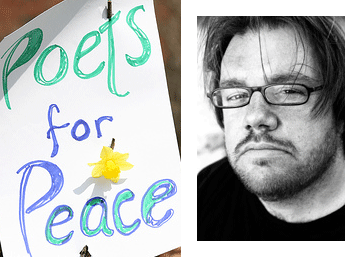
The Iraqi poet Sinan Antoon, attending the Split This Rock Poetry Festival in Washington, D.C. last weekend, was interviewed along with two other poets on NPR on March 10. Here is a brief excerpt, but there is more at the website.
CONAN: Careful listeners can hear another person there in the studio with you at the Radio Foundation in New York City. That is Sinan Antoon, a poet and novelist originally from Iraq, and it’s good of you to be with us today, too.
Mr. SINAN ANTOON (Poet; Novelist; Assistant Professor, New York University): Thank you for having me.
CONAN: And in your tradition, we just heard about that “Poet’s Millions” program broadcast in the Gulf area. Poetry is revered in the Arab world.
Mr. ANTOON: Yes, it is. I should say about this “Million’s Poets” program, it’s not necessarily the best phenomenon we have nowadays because it supports and promotes a certain kind of populist poetry, which is important, and it has its audience. But yes, the tradition of poetry in the Arab world is 14 centuries old, and it’s been integral for the collective identity of people.
But in the modern, contemporary period, it was a very important forum for the anti-colonial struggle, for liberation and for a lot of people in expressing their resistance against dictatorships. So being a poet in the Arab world and saying what poets should say and defending the public and truth meant that, you know, poets are taken to court and are put in prison and are exiled, so…
CONAN: Troublemakers, yeah.
Mr. ANTOON: Well, as they should be. Artists should be troublemakers. Otherwise, you know…
CONAN: If you stopped just an average person on the streets of Baghdad or Cairo and asked them to recite a poem, would they be able to do that?
Mr. ANTOON: Yes, for sure. They would recite a poem or two. And I mean, it’s important to remember that poems and certain excerpts become, in themselves, moments in history. So definitely, because it’s inculcated in the culture and the education system, but because even until now, poets more than others are more able to crystallize and express intense emotions in very few words. So definitely they would be able to recite one poem at least for you.
CONAN: And poetry is poetry a profession? Is that something that you can make a living at, selling books and doing readings?
Mr. ANTOON: Very rarely nowadays. But of course, there are some poets who are very few, very few. They always have to supplement their it’s not a profession, not anymore. I mean, there are a few court poets, in quotes, who perhaps write panegyrics for this or that ruler, but the great majority of poets have other professions.
CONAN: Is it usually in academia, as it is in this country?
Mr. ANTOON: Some of them do. But this whole notion of creative writing programs does not exist in the Arab world, as elsewhere, but a lot of them happen to be teachers in college or in high school, but a lot of them are journalists and writers. They have to have something doing with language and culture in different ways.
Sinan Antoon was born in Iraq and moved to the US after the 1991 Gulf War. His poems, essays and translations have been widely published in Arabic and English (The Nation, Ploughshares, Bomb, World Literature Today, Banipal). His novel I`jaam: An Iraqi Rhapsody (City Lights) has been translated to five languages. The Baghdad Blues (poems) was published by Harbor Mountain Press. His translation of Mahmoud Darwish’s In the Presence of Absence is forthcoming from Archipelago Books in 2010. Antoon returned to Iraq in 2003 to co-direct the documentary film “About Baghdad,” about the lives of Iraqis in a post-Saddam occupied Iraq. He served as senior editor of the Arab Studies Journal and currently serves as contributing editor for Banipal: Magazine of Modern Arab Literature and as a member of the editorial committee of the Middle East Report. He is assistant professor at New York University.
For the full program, click here.